Final report for SGA18-001
Project Information
The SARE Advisory Committee uses the Georgia SARE LOGIC model objectives to help direct their activities each year in the following six established priority areas: compost, conservation tillage systems, direct marketing, grazing-based animal production systems, local food systems, and organic production. Each year, the Committee hosts trainings, workshops, and scholarships and distributes other educational materials to meet their objectives regarding the six priorities. This year, we awarded funds to agents to attend workshops and conferences, including the Young Harris/UGA Beekeeping Institute, Farming with Beneficials, and a Cover Crop Workshop. We also worked with a non-profit organization to host a Composting for Urban Growers workshop, the funds helped sponsor agents, farmers, and agricultural community educators. Funds were also used to cover program costs for delivering two Community Food Systems Assessment trainings for ANR and FACS agents. All of these activities increase knowledge and confidence in participating agriculture professionals which then translates to an increased ability to assist organic farmers, resource limited, and small farmers.
During 2006, the Georgia Model State Program developed a LOGIC Model to guide our training efforts. The LOGIC Model was then updated in 2015 to reflect the current needs of Georgia as directed by the SARE Advisory Committee. To reach our long-term goal of “Increased use of sustainable agriculture practices by producers at multiple scales supported by a knowledgeable network of agricultural professionals ensuring a high proportion of diverse, profitable, and environmentally-friendly farm operations”, we identified, in 2015, the following six areas for training workshops: compost, conservation tillage systems, direct marketing, grazing-based animal production systems, local food systems, and organic production.
In 2016, the SARE Advisory Committee decided that due to difficulties in identifying data that could be used as metrics for mid- and long-term goals in the Logic Model, the Model State Program funding would be better utilized for trainings and travel scholarships for agents and farmers in the state. We continue to gather good information on knowledge gains, behavior changes and how the trainings influence county programming among participants as a result of attending the SARE sponsored trainings and events.
Each year, the Advisory Committee identifies trainings and events that will address one or more of the six priority areas. For the 2018 – 2019 cycle, we awarded funds to agents to attend workshops and conferences, including the Young Harris/UGA Beekeeping Institute, Farming with Beneficials, and a Cover Crop Field Day. We also worked with a non-profit organization to host a Composting for Urban Growers workshop, the funds helped sponsor agents, farmers, and agricultural community educators. Funds were also used to cover program costs for delivering two Community Food Systems Assessment trainings for ANR and FACS agents. All of these activities increase knowledge and confidence in participating agriculture professionals which then translates to an increased ability to assist organic farmers, resource limited, and small farmers.
The 2018-2019 cycle built on our previous work with local food systems by developing and delivering two separate Food Systems Assessment trainings. The trainings were given to a joint group of both Agriculture and Natural Resource (ANR) and Family and Consumer Sciences (FACS) Extension agents in the northeast district. These trainings help communicate the importance of the work Extension agents do in their respective communities with regard to collecting information on where, how, and for whom food is grown, distributed, and consumed - all of which are part of a food system. ANR and FACS agents were encouraged to work together to identify various pieces of data in their counties to begin developing a food system map of the NE region. The 2018-2019 cycle also built upon our previous years' work with regard to conservation tillage by offering a Cover Crop Field Day in the Southwest district (this was held in both the NE and NW districts in the past grant cycle) and providing funds for several agents to attend. SARE funds also helped our new UGA nematologist perform research looking at nematode pressure and management practices, which impact many of the commercial crops grown in the Southwest. The research was presented at the Cover Crop Field Day to help farmers learn new techniques for minimizing the impact of these agricultural pests.
2020 and the COVID-19 pandemic brought a host of challenges along, including severely limiting the ability to conduct in-person programming. Despite the hurdles, we were able to use funding from this grant to support travel expenses for agents to the American Forage and Grasslands Council conference in January 2021, and the cost of seeds for a cover crop training. Both of these initiatives support agents and farmers in advancing their knowledge of cover crops, conservation tillage, and sustainable management practices. We also continued to distribute SARE materials through tabling at the 2020 Georgia Organics conference, the UGA campus farmers market, and to Extension agents.
Advisors
Education
Education & Outreach Initiatives
Programming and activities to promote composting is an activity identified by the SARE Advisory Committee and part of the Model State Program Logic Model. As part of this objective a Composting for Urban Growers Workshop was held in order to train county Extension agents, farmers, and community gardeners science-based methods for creating, maintaining and scaling up compost piles for use in gardens that produce vegetables for human consumption. Workshop topics were aimed to educate new and beginning growers on composting best practices, safety standards and regulations, and practical troubleshooting for common compost issues.
SARE funds were awarded to the Truly Living Well Center for Natural Urban Agriculture to host a Composting for Urban Growers Workshop. Truly Living Well is an urban community garden whose mission is to bring good food, good health and well-being to Atlanta's urban community. They have a community compost facility and hold an annual soil festival to teach people about compost and soil health. SARE funds were used to support speaker fees, printing costs, site reservation, workshop materials, and agent and farmer scholarships. The workshop was held on April 11th, 2019. We had 27 participants, all of whom were either Extension agents, community garden coordinators, and small farmers/growers. The workshop agenda topics were: Why Composting, Best Practices, Working with Municipalities, Regulations and Safety Standards, Compost Assessment Activity, and Truly Living Well Case Study. The speakers/educators were comprised of Extension agents and specialists, city government officials, and community garden directors.
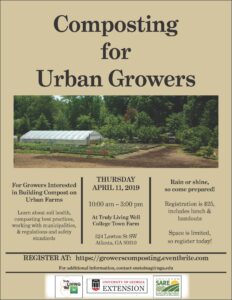
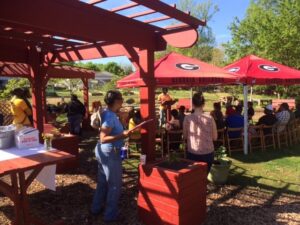
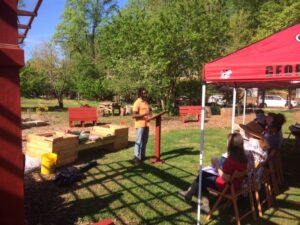
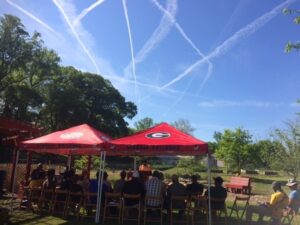
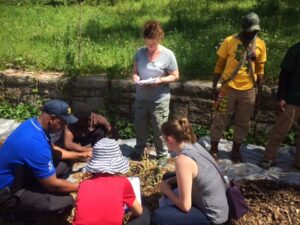
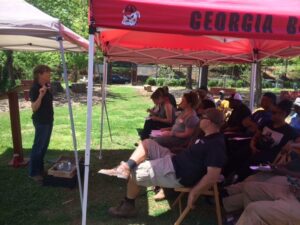
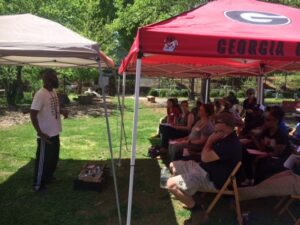
Participants filled out a post-workshop evaluation of their experience, with 50% of participants stating they planned to increase their compost efforts, and 50% indicating they might try using some of the new techniques they learned about. 70% of participants thought the content was good, and 70% also thought the style, delivery and amount of information was excellent. This demonstrated that they method of delivering this kind of workshop was quite favorable, with most of the information being delivered outdoors, allowing participants plenty of hands-on learning experience. Evaluations were anonymous, so as to promote more honest feedback. Some of the direct quotes regarding how the workshop helped participants were:
Participant 1: "It spiked my interest and got me excited about spreading information about composting."
Participant 2: "The information was great, but I especially found the regulatory piece to be good because it was new for me and I will integrate it into my operation."
A week following the workshop, one of the Extension agents who attended sent an e-mail expressing her gratitude and said: "It was such a great program. I met a couple of folks at Aglanta (an annual agricultural conference event held in Atlanta) who were there and they were still talking about it. They mentioned they planned on doing a germination test anytime they get compost now."
Another Extension agent shared "I am scheduled to present at a conference on composting, so it was good information for preparing for that, and as an Extension agent, sometimes it's just as valuable to see how other people teach a topic. I will definitely add in some tweaks I gleaned from the workshop."
Local food systems were identified by the SARE Advisory Committee as an area where more training was needed to increase the capacity of Extension and other agricultural professionals to provide technical assistance to growers. As such, two trainings were held to teach Extension agents about food systems and their important role within that intricate network.
SARE funds were used to prepare and distribute materials for two separate trainings in the fall of 2018 to a joint group of Agriculture and Natural Resource (ANR) and Family and Consumer Sciences (FACS) agents in the NE district. The first training was held in November, and was an introduction to the concept of “food systems” and that as Extension agents, the critical role they play is to be information gatherers and bridge-builders in their respective counties. The training expanded on the importance of building stronger networks between ANR and FACS and that working together with other county offices helps begin building larger regional networks for how food is grown, distributed, marketed, consumed, and wasted/discarded. After the first training, the agents received a Food Systems Assessment form and were asked to take time over the next month to answer the questions on the assessment in order to be prepared for the more in-depth training in December. At the December training, agents were asked to share the results of their assessment for a more in-depth conversation about food systems. This direct feedback provided a more realistic look at how each county’s food system is different and allowed the training to take on a case study format for teaching agents how to continue to develop their food system network.
Each training had an average of 60 agents. Several weeks following the trainings, the Walton County ANR agent, Joel Burnsed, contacted our office to say he loved the training and had begun working in Walton County to get a food systems group together to help build and strengthen existing food networks from field to fork. We met with Joel and several of the board members of their group, the Walton Local Food Alliance, to discuss food systems assessments and other tactics for networking to pull together key players in a food system. Jackie Dallas was also one of the FACS agents who attended the trainings, who has recently been involved in the Foodshed UGA initiative, her involvement in the discussions at the trainings was really helpful for other agents to see how the assessment information is more than just collecting data, it provides a window into your county’s overall needs and highlights areas that can be addressed through Extension programming.
The Extension Program Development Coordinators for ANR and FACS have both reached out to the SARE Coordinators to request further training on this topic in the next two years. Agents continue to report this as an area of interest and need and would like to receive additional training on food systems in order to build stronger relationships and networks within their respective counties/regions.
Programming and activities to promote conservation tillage systems is an activity identified by the SARE Advisory Committee and part of the Model State Program Logic Model. As part of this objective a Cover Crop Field Day was sponsored in the spring of 2019 at the Jimmy Carter Plant Materials Center in Americus, Georgia for Extension and Natural Resource Conservation Service (NRCS) personnel to learn the most updated information on cover crops.
Forty Extension agents from the University of Georgia and Fort Valley State University as well as NRCS personnel attended this field day to learn from Extension specialists and USDA professionals about cover crops and equipment necessary for incorporating cover crops into various production systems. The field day began with presentations on cover crop selection, nitrogen and cover crops, nematodes and cover crops, and how cover crops affect weeds. The participants were also introduced to the new Southern Cover Crop Council website. Several field demonstrations were planted the previous fall to illustrate different cover crop varieties, seeding rates, and the effect of planting and termination dates. We also held a planter demonstration to show how to best set-up a planter to plant through heavy cover crop residue. In addition to offering travel scholarships for Extension agents to attend the Cover Crop Field Day, SARE funds were also provided to our new UGA Nematologist, Dr. Abolfazl Hajihassani (Dr. Abi), who has spent the past year conducting research in a greenhouse study examining the susceptibility and resistance of at least 15 cover crop species against two major species of root-knot nematodes, Meloidogyne incognita (southern root-knot) and M. arenaria (Peanut root knot). This information was presented at the training and discussed as a factor in cover crop selection.
With regard to the impact of the nematode research the SARE funds sponsored this year, Dr. Abi stated "This research is incredibly important because the problem of incessant infestation by plant-parasitic nematodes, in particular root-knot nematodes is a challenge commercial growers of vegetable crops face in Georgia. The data obtained from this study were communicated with Extension agents and Ag Professionals at a cover crop workshop in Americus, GA in March 2019 which will help agents and farmers be more aware of the potential control methods certain cover crop selections may have for future management of this incredibly devastating pest. The results of this screening study will help us conduct field experiments to assess the suppression effects of selected cover crops on root-knot populations in vegetable systems for effective and sustainable management of these nematode pests and will be presented at future Cover Crop Field Days."
There was a total of 40 attendees at the Cover Crop Field Day. The Field Day was held on March 19, 2019 at the Jimmy Carter Plant Materials Center in Americus, GA. We had 12 participants who submitted evaluations. Of the responses, 42% of participants indicated they would definitely make changes to their current practices, and 58% indicating they might try new things as a result of the information they learned. When asked, 56% of participants said the information they heard was new to them and was delivered in a way that they understood. The majority of participants reported this field day as being “Excellent”, as well as having a moderate to significant improvement in knowledge, interest and confidence of cover crops. The “Cover Crop Variety Demo” was the most favored workshop topic of the day. Several agents reported the workshop will help them work with their producers more efficiently and with more confidence, with one agent reporting that following the workshop, he was immediately able to assist a farmer in his county with the information gained. Agents also reported that they would be referring farmers to the new Southern Cover Crops Council website, which is partly funded from a SARE grant as a new resource for growers in the southern region.
This field also offered the benefit of a joint training with Extension and NRCS, which is critical to forging the personal relationships that can help both institutions work together to increase sustainability.
Local food systems and organic production were identified by the SARE Advisory Committee as areas where more training was needed to increase the capacity of Extension and other agricultural professionals to provide technical assistance to growers. SARE funds were used to sponsor agent travel to the 2018 Beekeeping Institute.
The UGA Honey Bee Program offers an annual Georgia beekeeping event in cooperation with Young Harris College. This event provides a vast amount of information in the form of lectures, workshops and demonstrations from esteemed local, regional, national and international beekeeping practitioners, authors, and researchers. The event also features hands-on training classes, beekeeping and honey judging certification programs, a distinguished regional honey show, and many other educational opportunities. Since 1992, the University of Georgia and Young Harris Beekeeping Institute (YHBI) has been the single most comprehensive opportunity in the Southeast for concentrated training in all aspects of practical beekeeping.
Following the Beekeeping Institute, Josh Fuder used the information he gained in the following ways:
- News Article “Pollinator Power: The Biology of the Honeybee”: June 2018. Cherokee Tribune as well as CAES newswire - http://newswire.caes.uga.edu/story.html?storyid=7614&story=Honeybee-101
- Local Program “Backyard Habitats” 25 attended July 2018
- Master Naturalist Training “Insect and Pollinator Diversity” October 2018 29 attended
- Cherokee Co. Bee School “Landscape considerations for honeybees” Feb 2019 35 attended
- NW Metro Master Gardener Training “Gardening for Pollinators” March 2019 47 attendees
- Cherokee Beekeepers Meeting “Flowers Biology, and Landscaping for bees” April 2019 25 attendees.
Southern SARE Programming and activities were identified by the SARE Advisory Committee and part of the Model State Program Logic Model. These programs are not only an important function of the Sustainable Agriculture Program at UGA, but Southern SARE Programming serves to maintain a strong presence and relationship among Extension agents, producers and educators in Georgia. It is vital to our continued programming efforts that the Advisory Committee meets at least once a year to discuss past, current and future events, membership, business matters, and to reassess the short and long-term goals of the Committee.
The SARE Advisory Committee held a conference call via Zoom in November, 2018. We welcomed four new members: Bobby Jones, farmer consultant and manager of Rome farmer cooperative; Aubrey Shirley, Tatnall County ANR Extension Agent; Michael Wall, Director of Farmer Services at Georgia Organics; and Robin Chanin, Executive Director at Global Growers. We also discussed events that took place in the past year to evaluate their potential to be incorporated into the current year’s programming.
The SARE Advisory Committee held calls in November 2019 and January 2021 to discuss future programming needs, the impacts of COVID-19 and what adaptations can be made, as well as an update on previous progress. New members to the committee include Dr. Kristie Wendelberger of the Rodale Southeast Organic Research Center, and Alicia Holloway, ANR agent in Barrow County Extension.
Eight Committee members were able to participate in the conference call on November 27, 2018. New members were welcomed and the Advisory Committee discussed successful programs and events from the past year and talked about ways to maximize the impact for the upcoming workshops and events that were scheduled, such as the Composting for Urban Growers workshop, and the Cover Crop Field Day. The AC also discussed ways of addressing other priority areas for the upcoming cycle. A consensus was met with regard to providing scholarships for agents to attend the 2019 UGA Grazing School and Grassmasters courses. Several members suggested developing a workshop that would focus on market readiness as a means of addressing the SARE Direct Marketing priority area. Other suggestions included trainings on season extension under high tunnels, teaching and communication methods for Extension agents, climate readiness/resiliency training, and land-leasing workshops for farmers and agents.
Southern SARE Programming and activities were identified by the SARE Advisory Committee and part of the Model State Program Logic Model. These programs are not only an important function of the Sustainable Agriculture Program at UGA, but Southern SARE Programming serves to maintain a strong presence and relationship among Extension agents, producers and educators in Georgia. A critical piece of our outreach and education efforts is to disseminate the most current, research-based information and resources to our new and beginning Extension agents, in an effort to equip them with the necessary tools to meet the needs of their agricultural producers and county residents.
New ANR Extension agents learned about sustainable agriculture production and were given an overview of the many publications and resources available to them from SARE. They learned about the Sustainable Agriculture Program at UGA and how the SARE program works, especially with regard to the various grants available through Southern SARE.
This presentation was delivered as part of a Foundations Training for new ANR Extension agents in Georgia, which increased their familiarity with sustainable agriculture practices and SARE publications that will help them support their county producers and local businesses and residents. There were 27 new agents at the training.
Southern SARE Programming and activities were identified by the SARE Advisory Committee and part of the Model State Program Logic Model. These programs are not only an important function of the Sustainable Agriculture Program at UGA, but Southern SARE Programming serves to maintain a strong presence and relationship among Extension agents, producers and educators in Georgia. SARE books and publications were distributed to agents and at events to the general public to help educate about sustainable agriculture.
SARE books, such as “Managing Cover Crops Profitably”, “Building a Sustainable Business”, “Building Soils for Better Crops”, “Organic Transition”, “Crop Rotation on Organic Farms”, “Managing Alternative Pollinators”, “The New American Farmer”, “The New Farmers’ Market”, “Youth: Renewing the Countryside”, “Farmer’s Guide to Business Structures”, and “Systems Research for Agriculture” were books that were distributed to county Extension agents during our annual book distribution at Winter School. We also distribute various SARE publications throughout the year at the different conferences, trainings, presentations and events that we hosted and/or attended. The SARE publications are used to distribute information for farmers, gardeners, or general public about sustainable agriculture. From May 1, 2018 through April 30, 2019 we distributed a total of 104 publications to the general public, growers, and Extension agents throughout the state.
From May 2018-April 2019, 227 SARE books have been given to new agents around the state. The most popular book was the new “Farmer’s Guide to Business Structures” and a tie between “Building a Sustainable Business” and “Crop Rotation on Organic Farms”. We saw an increased interest in the public for information regarding native pollinators and beneficial insects, as well as organic fertilizer options.
From July 1, 2019 - April 30, 2021 (extended due to no required reporting in 2020), 32 SARE books, 20 SARE USB drives, and over 150 other SARE publications were distributed to Extension agents, the Georgia Organics conference (February 2020), the UGA campus farmers' market, and two UGA Earth Day Events in 2021.
Local food systems and organic production were identified by the SARE Advisory Committee as areas where more training was needed to increase the capacity of Extension and other agricultural professionals to provide technical assistance to growers. SARE funds were used to sponsor agent travel to the Farming with Beneficials workshop that was hosted by USDA NRCS.
More research is being done on the benefits of incorporating beneficial insects into production systems, mainly as a form of biological pest control. Many organic producers find this information to be helpful, but require more specific guidance on how to manage alternative pollinators and beneficial insects on-farm. This training highlighted the most current results from a team of UGA researchers looking at incorporating pollinator plots in the midst of cash crops in order to attract predatory insects as well as pollinator species. Speakers also talked about current invasive pest insects that pose the greatest threat to the agricultural industry, and best management practices for mitigating their impact on-farm. They also talked about how to plant cover crops to attract pollinators and beneficials. Participants learned how to scout for insects, and identify pests vs. beneficials during a hands-on activity. SARE funds were used to sponsor agent travel and registration for Amanda Tedrow, the Athens-Clarke County Extension agent.
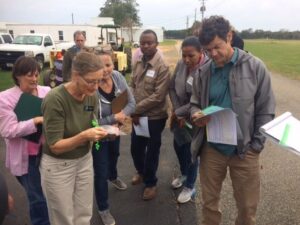
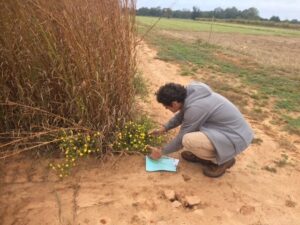
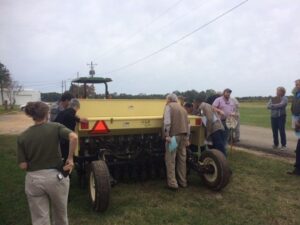
Since attending this training, Ms. Tedrow has moved up to a leadership position in Extension as the Northeast District Program Development Coordinator. She has already held one Agriculture and Natural Resources training on pesticide effects on pollinators (Feb 28, 2019; 30 attendees). Further trainings are anticipated and she is encouraging Extension agents in her district to attend this type of training.
Grazing-based animal production systems and conservation tillage systems are both areas that were chosen by the advisory committee as areas of emphasis for train-the-trainer programs. This conference offers resources for agents to learn about both of these subjects from the region's experts in the field, and bring that knowledge to their communities and local farmers.
During the reporting period of July 1, 2019 - April 30, 2021 (extended due to no required reporting in 2020), this award was used to pay for the travel expenses for two Extension agents, Steve Morgan of Harris County and Paula Burke of Carroll county, to attend the American Forage and Grasslands council conference in Savannah, Georgia in January 2021.
Both of these agents gained knowledge that will be used in assisting the farmers in their counties, as well as possibly for future programming in their offices. They are enthusiastic about attending this and similar educational opportunities in the future, and implementing the methods learned here focusing on conservation tillage, grazing-based production, and sustainable forage management.
Through cover crop demonstrations, we hope to promote conservation tillage education and opportunities. Conservation tillage has been identified as an area of emphasis by the SARE advisory committee.
During the period of July 1, 2019 - April 30, 2020 (extended due to no required reporting in 2020), this award provided $780.85 to purchase seed for a cover crop demonstration and training in southeast Georgia.
Agents and growers had an opportunity to expand their knowledge base with hands-on cover crop lessons let by Dr. Tim Coolong.
Educational & Outreach Activities
For the period of July 2019 - April 2021, 35 new addresses were added to the Sustainable Ag listserv to receive the Sustainable Agriculture newsletter. The Sustainable Agriculture Program Assistant also ran the Sustainable Food Systems Initiative at UGA listserv, which has 121 subscribers and often features SARE news, events, education, and grant opportunities.
2) Sustainable Agriculture at UGA Facebook page- The Facebook page is used to distribute news, event/workshop announcements, resources, and other information for farmers, gardeners, or the general public about sustainable agriculture. Between May 1st 2018 and April 30th 2019 we have increased our Facebook page "likes" from 533 to 647. We made 162 posts, which has resulted in a reach of 20,151 unique users or an average of 124 people per post with the most popular post engaging 1,388 people on how America uses its land. Our posts were also "shared", "liked", "commented" on or "clicked on" a total of 820 times.
3) Sustainable Agriculture at UGA Website (SustainAgGA.org)- The website is used to distribute news, event/workshop announcements, resources, and other information for farmers, gardeners, Extension personnel, or the general public about sustainable agriculture. Between May 1st, 2018 and April 30th, 2019 the SustainAgGA.org website has received 8,555 unique visitors, with 21,626 page views. This is a slight decrease from last year; however, this may be due to the fact that for several months of the year the University of Georgia was performing a system-wide update of all websites, which impacted our ability to edit and display our website. We expect our visitors and page views to increase over the next year as all updates have been finalized.
Between July 1, 2019 and April 30, 2021, the Sustainable Agriculture at UGA website has had 52,140 page views. This is a significant increase in the number of visitors, possibly due in part to the reasons mentioned above, the switch to mostly online instruction due to the COVID-19 pandemic, and increased promotion of the website through social media, the Journeyman Farmer program, and other avenues.
4) Sustainable Agriculture at UGA Newsletter- The Sustainable Agriculture Newsletter is our quarterly newsletter that has information for farmers, gardeners, Extension personnel, and others interested in sustainable agriculture in Georgia. Please see attached newsletters. This goes out to the 1003 people on the listserv and is distributed at conferences and workshops. Three newsletters were published and distributed between May 1, 2018 and April 30, 2019.
Two additional newsletters were published in 2020 – one in winter and one in fall. The gap in newsletter publication is due to a change of personnel in the Sustainable Agriculture Program Assistant position in 2019, followed by an interruption of scheduled publication due to the COVID-19 pandemic in 2020. Henceforth, the newsletter publication is expected to resume quarterly publication.
5) UGA Sustainable Food Systems Initiative events- The Sustainable Food Systems Initiative is in the process of turn over, as the director and two other Executive Committee members are retiring. We had two strategic planning meetings as the new director has stepped in and we’ve had two new members join the Committee. With new leadership, we have experienced new, fresh ideas for capacity building. We hosted a film screening of “Food Evolution” on campus in the fall, that was followed by a panel discussion focused on the science and societal repercussions of GMOs. We also hosted a film screening of “Wasted! The Story of Food Waste” at a local cinema. The event was open to the public and drew more than 300 participants. Several chefs prepared meals of food that would have typically been deemed unattractive or useless. The event hosted a small Expo with several community organizations and programs that work to bring awareness to food waste. The SFSI worked to put in a proposal to host the 2020 Agriculture, Food and Human Values Society Conference. We have been accepted and are now in the midst of conference planning for May 2020. The SFSI has also recently partnered with the Office of Sustainability and the Office of Service Learning to launch a new initiative, called Foodshed UGA, which creates learning modules that can be used in any subject to help teach students about the food system. The initiative also creates a space for all organizations and members of the greater Athens community who are involved in the growing, selling, distributing, waste/repurposing of food. The SARE program assistant helped put the film screenings, panel discussion and banquet together and promote the event across campus and through social media. The SARE Program Assistant also wrote and submitted the proposal for the 2020 conference and is now serving as the Local Arrangements Committee chair for the conference planning. The SARE Program Assistant is also a member of the new Foodshed UGA initiative and is helping promote and further the initiative in the community. Another film screening event is being planned for fall 2019.
Between July 2019 and April 2021, the SARE Program Assistant continued to work with the UGA Sustainable Food System Initiative for conference and event planning. Notably, the program assistant has been a prominent contributor to the following events:
- Screening and panel discussion of the film “Hearts of Glass”
- Screening and panel discussion of the film “Gather”
- Professional development panel discussion about interdisciplinary professional opportunities in sustainable agriculture
- SARE and SFSI tabling events at the UGA campus farmers market and Earth Day events (2)
- Partnering with Spelman College to write a HEC grant proposal ($300,000) aimed at increasing diversity and creating a more inclusive environment for students pursuing food and agriculture degrees
6) New Southern Cover Crops Council Website: A new resource is available for growers in the southern region, that will help make decisions for implementing cover crops in conventional production systems. The Southern SARE program and the Georgia NRCS provided funding for the creation of a Southern Cover Crops Council to “to facilitate and enhance communication and collaboration among producers, Extension, researchers, and other agricultural professionals, and transfer information and technology to promote the successful adoption and integration of cover crops into southern agricultural systems.” Use of cover crops in the Southern region has been slow compared to the Midwest, as there are many barriers to adoption due to the diversity of soils, climates and production systems within the Southern region, and much of the information available to address these issues is from the Midwest or other regions of the United States. There is no “one size fits all” when it comes to selecting the most effective varieties of cover crops. The purpose of the website is to improve farmers’ access to practical knowledge on using cover crops. The structure and content for the website was guided by farmer input, as well as Extension and NRCS data and feedback. Currently, the website has been built with information for row crops in the Coastal Plain region and is currently undergoing development for vegetable and grazing production systems. The ultimate vision is that this tool will empower farmers to be better stewards of our natural resources while improving quality of life for a wide cross-section of stakeholders for generations to come.
7) Cover Crop Information Sheets: Specific cover crop information sheets were developed for 27 different cover crops that are used in row crop vegetable production systems in the Coastal Plains of the southern region, broken down into sections on the website for either fall/winter planted or spring/summer planted cover crops. They provide important information for growers regarding planting dates, depths, temperatures, termination recommendations, relative costs, etc.
8) Georgia Fruit and Vegetable Growers Association Meeting- Julia Gaskin organized the organic track of speakers at this conference, which took place January 11 - 14, 2019 at the Savannah International Trade and Convention Center in Savannah, GA. Julia identified eleven speakers for the organic track of the conference.
In 2020, Dr. Coolong presented at the Fruit and Vegetables Growers Conference on Organic Onion Fertilization (virtual).
9) Article in ACE Conference Proceedings: Association for Communication Excellence (ACE) Conference 2019. ACE develops the professional skills of education, government and research communicators, and information technologists to extend knowledge about agriculture, natural resources, and life and human sciences to people worldwide. They are a vibrant, international association of communicators, educators and information technologists. The independent, non–profit organization offers professional development and networking for individuals who extend knowledge about agriculture, natural resources, and life and human sciences. The SARE Program Assistant helped conduct two focus group discussions with agents, NRCS personnel, and faculty in soil and plant sciences in the southern region to discuss the usability of the new Southern Cover Crops Council website. Following the focus groups, the program assistant analyzed the transcripts using a thematic analysis and wrote up the findings in a paper titled “Website Usability of a Cover Crop Resource in the Southern Region”. The results of the focus groups are presented in the paper, along with recommendations for practitioners in agricultural fields for disseminating information to growers and agents through online platforms, with particular attention focusing on website usability.
10) Georgia Organics Expo Booth: The Georgia Organics Conference is a premier conference for organic producers and small farms. The educational sessions focus on a wide range of our training objectives including, organic production, conservation tillage systems, grazing-based animal production systems, composting, direct marketing, and local foods systems. Our SARE Advisory Committee decided not to allocate funds for agent scholarships to the 2019 Georgia Organics conference; however, it is an important annual event that helps maintain a good relationship between the organic grower community with SARE and Extension so we set up a booth at the Expo.
In February 2020, the Georgia SARE and Sustainable Ag at UGA teams set up an expo table at the Georgia Organics conference. At this event, SARE information and books were distributed, and several new people signed up for the Sustainable Agriculture email listserv.
11) Sustainable Gardening Presentation at Augusta Master Gardeners Training: The SARE Program Assistant delivered an hour and half presentation at the Augusta Master Gardener Training in February, 2019 on sustainable gardening methods and best practices. There were 43 participants in the course.
Participation summary:
Learning Outcomes
Project Outcomes
Face of SARE
The Georgia SARE Model State Program increased participation in sustainable agriculture programming from May 1, 2018 through April 30, 2019, as evidenced by the increase in attendance at events, the increase in collaborative events, and more name recognition for SARE. We continued conducting stand-alone workshops to address specific areas of our Logic Model. Other Model State efforts include collaborative events like organizing the organic conference at Georgia Fruit and Vegetable Growers’ annual conference, providing scholarships for several sustainable agriculture related conferences, and continued populating/updating of the sustainable agriculture website and Facebook page. Additionally, we publish a quarterly newsletters which are distributed through our listserv. We have displayed information about SARE at several events and at applicable trainings and workshops around the state such as the Georgia Organics Conference. By organizing and displaying at a variety of different events, we are able to reach a wider and more diverse audience.
The Georgia SARE Model State Program increased participation in sustainable agriculture programming for period between July 2019 and April 2021 by supporting efforts to transition to virtual formatted programming in the wake of COVID-19. We continued planning in-person workshops to address specific areas of our Logic Model when in-person gathering is safe. Through collaboration efforts with the Sustainable Food Systems Initiative, UGA Office of Sustainability, AFHVS/ASFS conference planning committee, Grow It Know It, UGA Foodshed, Fort Valley State University Extension, the American Forage and Grasslands Council, and the Rodale Institute Southeast Organic Research Center, we have promoted SARE tremendously within the University of Georgia and beyond despite being able to hold traditional workshops. Additionally, providing an exceptional number of conference scholarships for Extension personnel in the past year has not only allowed us to have many representatives of UGA and SARE at these reputable events, but has afforded Extension agents the opportunity to build their knowledge and skill set around sustainable agriculture so that they may more effectively encourage sustainable practices among their constituents. We also promote SARE via the list serv, quarterly newsletters, social media, and in-person events so that we may reach and wide and diverse audience. Most recently, SARE materials were promoted and handed out at the UGA campus farmers' market and multiple UGA Earth Day events.